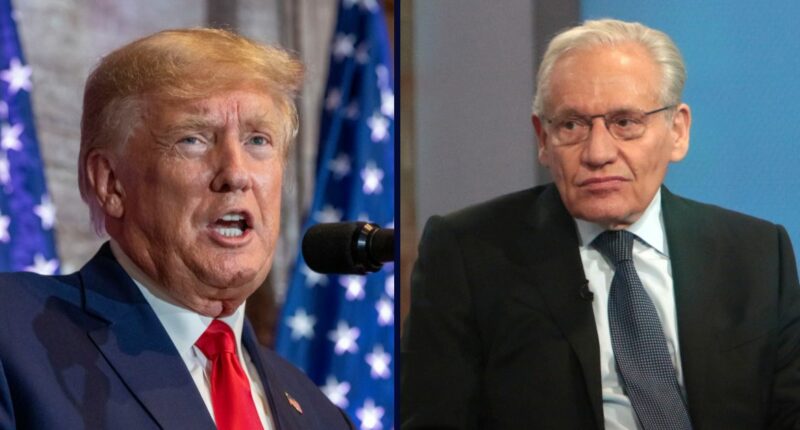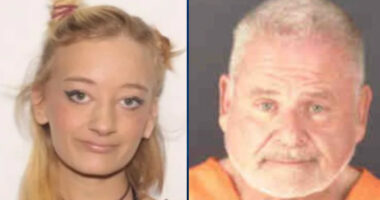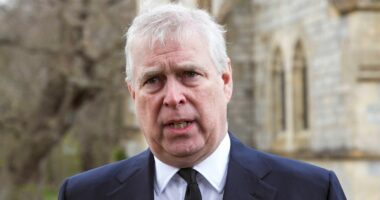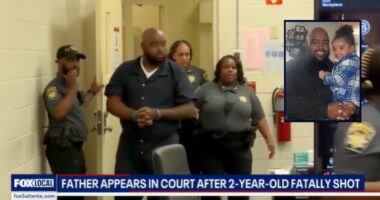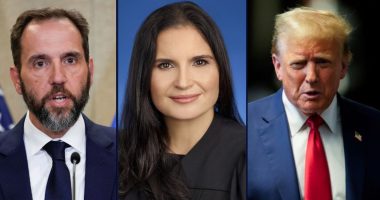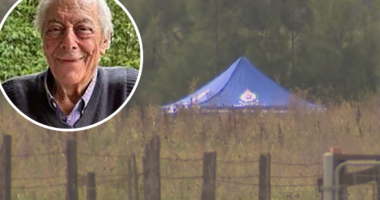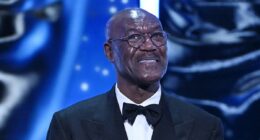Share this @internewscast.com
Left: FILE – Then-former President Donald Trump addresses a crowd at a campaign event at the South Carolina Statehouse on Saturday, Jan. 28, 2023, in Columbia, S.C. On Monday, Jan. 30, Trump initiated a lawsuit against journalist Bob Woodward, asserting that he never authorized the public release of interview recordings conducted for the book “Rage” (AP Photo/Alex Brandon, File). Right: Bob Woodward, promoting his third book on Donald Trump, Peril, on Good Morning America in New York City on September 20, 2021 (Credit: RW/MediaPunch/IPX).
A federal court on Friday dealt President Donald Trump a personal loss in his copyright lawsuit against book publisher Simon & Schuster.
The lawsuit arose from a series of interviews conducted with the 45th and 47th president by renowned Watergate journalist Bob Woodward during Trump’s first presidential term. Although these interviews were intended for a book, they were recorded and subsequently released in various audio formats.
In January 2023, Trump filed a lawsuit in the Northern District of Florida, alleging multiple violations concerning copyright, contract, and licensing. The nine-count lawsuit targeted Woodward himself, as well as Simon & Schuster’s parent company, Paramount Global, as defendants.
“This case centers on Mr. Woodward’s systematic usurpation, manipulation, and exploitation of audio of President Trump gathered in connection with a series of interviews conducted by Mr. Woodward,” the 31-page complaint alleged. “Said audio was protected material, subject to various limitations on use and distribution—as a matter of copyright, license, contract, basic principles of the publishing industry, and core values of fairness and consent.”
But the case quickly went off the plaintiff’s preferred set of rails.
In August 2023, the defendants won a change of venue and forum request. The Sunshine State federal court determined that the Southern District of New York – in Manhattan – was “the most appropriate and convenient forum for the parties and witnesses and the one with the strongest connection to the dispute.” Trump originally sued in Florida because he lives there and Paramount does business there.
In November 2023, Trump fine-tuned his allegations with a second amended complaint – this time, whittling the allegations down to seven counts while developing out the claimed facts a bit more.
Now, U.S. District Judge Paul G. Gardephe, a George W. Bush appointee, has dismissed Trump’s lawsuit in its entirety – largely on the basis that the lawsuit “does not plausibly allege that Woodward and Trump intended to be joint authors of The Trump Tapes.”
In an 81-page memorandum opinion and order, the court determined Trump’s lawsuit did not even bother to argue he actually “fixed” the relevant content into a “tangible medium of expression.”
This language, the court explains, is the heart of modern U.S. copyright law – sourced from statute and longstanding case law.
“Here, Woodward recorded the interviews at issue and thereby fixed the interviews in a ‘tangible medium of expression,'” the court notes. “Plaintiff – for his part – does not allege in the [lawsuit] or assert in briefing that he played any role in ‘fixing’ the interviews into a ‘tangible medium of expression,’ and does not respond to Defendants’ arguments that the ‘author’ – for purposes of copyright law – is ‘the person who translates an idea into a fixed, tangible expression.'”
In basic terms, the court is saying Woodward is the person who initiated the interviews – noting that he also physically recorded the interviews – and is essentially responsible for the interviews becoming the copyrighted works. The court likens Trump’s role to that of an actor in a film – explaining that a copyright claim by an actor was rejected for the same reason in an instructive prior case.
Additionally, the court found Trump’s “responses to Woodward’s questions do not themselves constitute a work of authorship entitled to copyright protection.”
The analysis in this portion of the opinion is similar to the basic idea about how copyrighted ideas are “fixed” by their authors.
From the opinion, at length:
Woodward’s interviews of Trump are, of course, a collaborative exercise: Woodward asked questions, and Plaintiff provided answers. But the fact that the interviews required Plaintiff’s active cooperation and participation does not mean that he automatically is entitled to a copyright interest in his responses to Woodward’s questions. Indeed, courts have repeatedly held that the fact that someone has made meaningful contributions to a work does not mean that they have a copyright interest in that work. Moreover, and as discussed above, there is almost no support in the case law for the notion that an interviewee has a copyright interest in his responses to interview questions, and such a conclusion would run counter to animating principles of the Copyright Act.
The judge then returns to the film example from the prior section – acknowledging “a series of interviews are quite different from the film at issue” in the earlier case.
“The Court nonetheless views the question and answer interview format as something that – like the film in [the earlier case] – must be viewed as a ‘unified work, rather than [as a series of] individual statements,'” Stripping out the answers from an interviewer’s questions is not only inconsistent with the animating principles of the Copyright Act; it also ignores the fundamental reality that an interview is a unified, integrated work and not a collection of disjointed and unrelated random thoughts and phrases.”
Gardephe says Trump’s responses and Woodward’s questions have “little or no independent meaning standing alone,” and “thus the interviews reflecting their exchanges must be treated as what they are: a unified, integrated work.” The judge adds: “because Plaintiff’s contributions to that unified integrated work “are inseparable from the work,” they “cannot separately obtain [copyright] protection.”
